最新人教版小学五年级英语下册重点知识归纳
- 格式:docx
- 大小:145.44 KB
- 文档页数:13
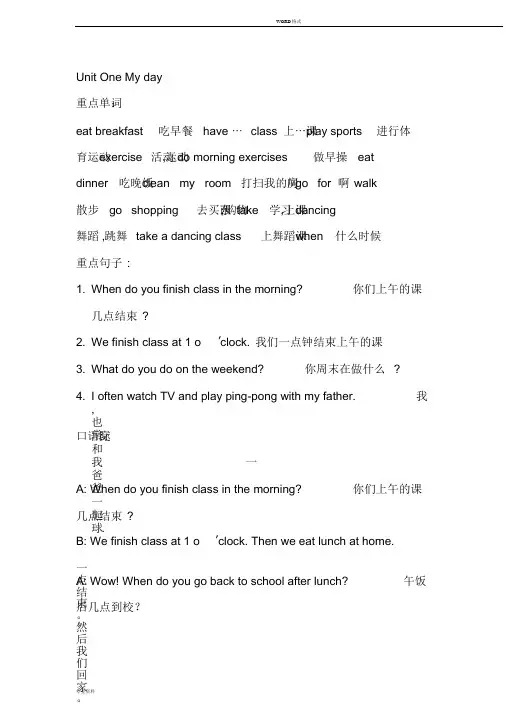
Unit One My day 重点单词: eat breakfast吃早餐 have ⋯ class 上⋯课p lay sports 进行体育运动e xercise 活动,运动d o morning exercises做早操 eatdinner 吃晚饭c lean my room 打扫我的房间go for 啊 walk 散步 go shopping去买东西,购物t ake 学习,上课d ancing舞蹈 ,跳舞 take a dancing class 上舞蹈课w hen 什么时候重点句子 :1. When do you finish class in the morning? 你们上午的课几点结束 ?2. We finish class at 1 o’clock. 我们一点钟结束上午的课.3. What do you do on the weekend?你周末在做什么 ?4. I often watch TV and play ping-pong with my father. 我 ,也常和我爸爸一起球.口语交际: 一 A: When do you finish class in the morning? 你们上午的课 几点结束 ? B: We finish class at 1 o ’clock. Then we eat lunch at home. 一点结束。
然后我们回A: Wow! When do you go back to school after lunch? 午饭后几点到校?B: At 2:30. Classes start at 3 o ’clock. 两点半到校,三点上课。
A: When do you usually eat dinner in Spain? 在西班牙你们通常几点吃晚饭?B: Usually at 9:30 or 10 o ’clock. 通常在九点半或十点。
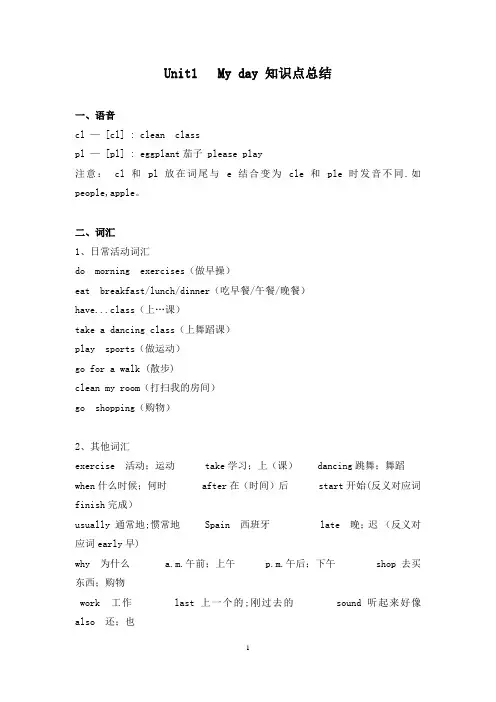
Unit1 My day 知识点总结一、语音cl — [cl] : clean classpl — [pl] : eggplant茄子 please play注意:cl 和 pl 放在词尾与 e 结合变为cle 和 ple 时发音不同.如people,apple。
二、词汇1、日常活动词汇do morning exercises(做早操)eat breakfast/lunch/dinner(吃早餐/午餐/晚餐)have...class(上…课)take a dancing class(上舞蹈课)play sports(做运动)go for a walk (散步)clean my room(打扫我的房间)go shopping(购物)2、其他词汇exercise 活动;运动 take学习;上(课)dancing跳舞;舞蹈when什么时候;何时 after在(时间)后 start开始(反义对应词finish完成)usually 通常地;惯常地 Spain 西班牙 late 晚;迟(反义对应词early早)why 为什么 a.m.午前;上午 p.m.午后;下午 shop去买东西;购物work 工作 last上一个的;刚过去的 sound听起来好像also 还;也busy 忙的need 需要play 戏剧剧本 letter 信Live 居住island 岛always 总是;一直 cave 山洞;洞穴go swimming 去游泳win 获胜。
三、句型以及语法知识点1、询问别人什么时候做某事某种活动的when特殊疑问句型,使用时间短语回答。
When do you do morning exercises? 你何时做早操?I do morning exercises at 7:00.我七点钟做早操。
When do you finish class in the morning? 你们上午的课到什么时候结束?We finish class at 1 o’clock.我们一点钟结束上午的课。
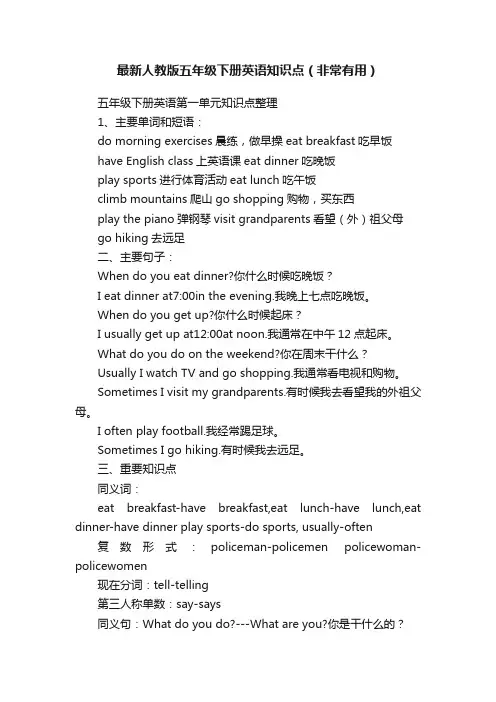
最新人教版五年级下册英语知识点(非常有用)五年级下册英语第一单元知识点整理1、主要单词和短语:do morning exercises晨练,做早操eat breakfast吃早饭have English class上英语课eat dinner吃晚饭play sports进行体育活动eat lunch吃午饭climb mountains爬山go shopping购物,买东西play the piano弹钢琴visit grandparents看望(外)祖父母go hiking去远足二、主要句子:When do you eat dinner?你什么时候吃晚饭?I eat dinner at7:00in the evening.我晚上七点吃晚饭。
When do you get up?你什么时候起床?I usually get up at12:00at noon.我通常在中午12点起床。
What do you do on the weekend?你在周末干什么?Usually I watch TV and go shopping.我通常看电视和购物。
Sometimes I visit my grandparents.有时候我去看望我的外祖父母。
I often play football.我经常踢足球。
Sometimes I go hiking.有时候我去远足。
三、重要知识点同义词:eat breakfast-have breakfast,eat lunch-have lunch,eat dinner-have dinner play sports-do sports, usually-often 复数形式:policeman-policemen policewoman-policewomen现在分词:tell-telling第三人称单数:say-says同义句:What do you do?---What are you?你是干什么的?表示频度的副词:always总是,一直;usually通常,常常;often经常;sometimes有时候以复数形式出现的词组:visit grandparents,plant trees介词后跟表示时间的词语时,表示在某年、某月、某个季节,某个时候(在上午,在下午,在晚上)用in;表示在某一天,在星期几用on,在具体的几点几分用at.too和either的用法区别:too和either都是“也”的意思,但too用于肯定句,either用于否定句。
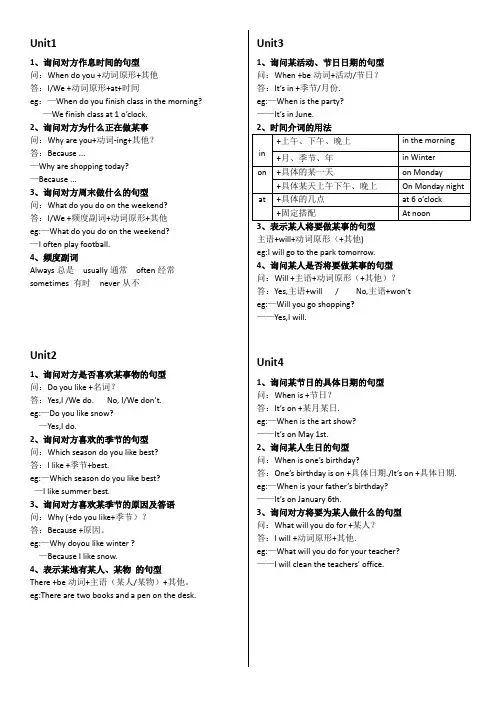
Unit11、询问对方作息时间的句型问:When do you +动词原形+其他答:I/We +动词原形+at+时间eg:—When do you finish class in the morning?—We finish class at 1 o’clock.2、询问对方为什么正在做某事问:Why are you+动词-ing+其他?答:Because ...—Why are shopping today?—Because ...3、询问对方周末做什么的句型问:What do you do on the weekend?答:I/We +频度副词+动词原形+其他eg:—What do you do on the weekend?—I often play football.4、频度副词Always总是usually通常often经常sometimes 有时never从不Unit21、询问对方是否喜欢某事物的句型问:Do you like +名词?答:Yes,I /We do. No, I/We don’t. eg:—Do you like snow?—Yes,I do.2、询问对方喜欢的季节的句型问:Which season do you like best?答:I like +季节+best.eg:—Which season do you like best?—I like summer best.3、询问对方喜欢某季节的原因及答语问:Why (+do you like+季节)?答:Because +原因。
eg:—Why doyou like winter ?—Because I like snow.4、表示某地有某人、某物的句型There +be动词+主语(某人/某物)+其他。
eg:There are two books and a pen on the desk.Unit31、询问某活动、节日日期的句型问:When +be动词+活动/节日?答:It’s in +季节/月份.eg:—When is the party?——It’s in June.主语+will+动词原形(+其他)eg:I will go to the park tomorrow.4、询问某人是否将要做某事的句型问:Will +主语+动词原形(+其他)?答:Yes,主语+will / No,主语+won’t eg:—Will you go shopping?——Yes,I will.Unit41、询问某节日的具体日期的句型问:When is +节日?答:It’s on +某月某日.eg:—When is the art show?——It’s on May 1st.2、询问某人生日的句型问:When is one’s birthday?答:One’s birthday is on +具体日期./It’s on +具体日期. eg:—When is your father’s birthday?——It’s on January 6th.3、询问对方将要为某人做什么的句型问:What will you do for +某人?答:I will +动词原形+其他.eg:—What will you do for your teacher?——I will clean the teachers’ office.1、描述物品归属的句型物品+ be动词(is/are)+(mine/his/hers/yours/ours/theirs) eg:The book is yours.2、确认物品归属地句型问:be动词+this/that/these/those(+其他)+某人的?答:Yes,it is. Yes,they are./ No,it,is’t. No,they aren’t. eg:—Is that crayou his?——Yes,it is.3、询问物品归属的句型问:单数Whose+is it/this/that?复数Whose+are they/these/those?答:It’s/They’re+名词性物主代词/ 名词所有格eg:—Whose bag is this?——It’s mine.4、现在进行时的一般疑问句问:Be动词+主语+动词-ing(+其他)?答:Yes,主语+be动词/ No,主语+be动词+not. eg:—Is she listening to music?——Yes,she is.5、描述某人正在做某事主语+be动词(am/is/are)+动词-ing(+其他).eg:I’m doing my homework now.6、询问某人能否做某事问:Can+主语+动词原形+其他?答:Yes,主语+can. /No,主语+can’t.eg:—Can I play football?——Yes,you can.Unit61、询问多个人或动物正在做什么的句型问:What are +主语(复数)+doing?答:主语(复数)+are+动词-ing+其他.eg:—What are the boys doing?——They are jumping2、询问单个人或动物正在做什么的句型问:What is +主语(单数)+doing?答:主语(单数)+is+动词-ing+其他.eg:—What is Tom doing?——He is playing football.。
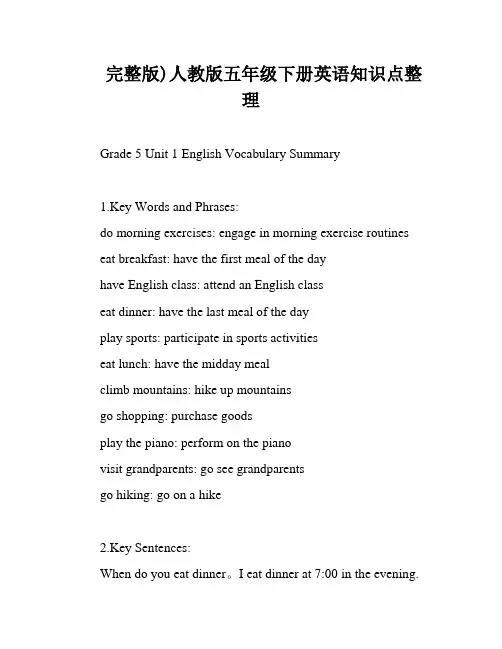
完整版)人教版五年级下册英语知识点整理Grade 5 Unit 1 English Vocabulary Summary1.Key Words and Phrases:do morning exercises: engage in morning exercise routines eat breakfast: have the first meal of the dayhave English class: attend an English classeat dinner: have the last meal of the dayplay sports: participate in sports activitieseat lunch: have the midday mealclimb mountains: hike up mountainsgo shopping: purchase goodsplay the piano: perform on the pianovisit grandparents: go see grandparentsgo hiking: go on a hike2.Key Sentences:When do you eat dinner。
I eat dinner at 7:00 in the evening.When do you get up。
I usually get up at 12:00 at noon.What do you do on the weekend。
Usually。
I watch TV and go shopping。
Sometimes。
I go hiking.I often play football.3.Important Points:Synonyms: eat breakfast - have breakfast。
eat lunch - have lunch。
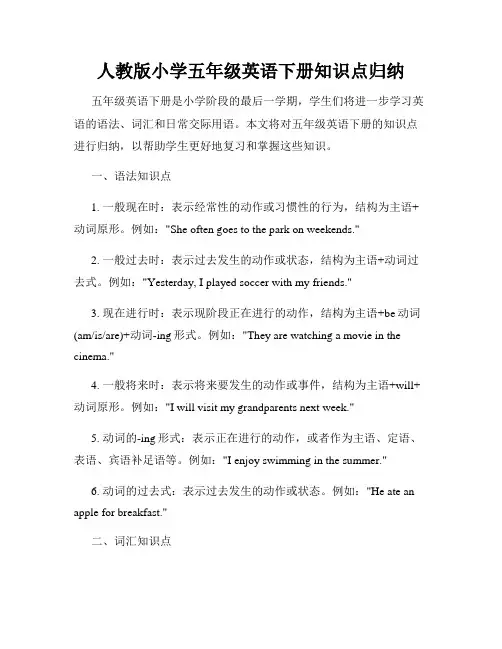
人教版小学五年级英语下册知识点归纳五年级英语下册是小学阶段的最后一学期,学生们将进一步学习英语的语法、词汇和日常交际用语。
本文将对五年级英语下册的知识点进行归纳,以帮助学生更好地复习和掌握这些知识。
一、语法知识点1. 一般现在时:表示经常性的动作或习惯性的行为,结构为主语+动词原形。
例如:"She often goes to the park on weekends."2. 一般过去时:表示过去发生的动作或状态,结构为主语+动词过去式。
例如:"Yesterday, I played soccer with my friends."3. 现在进行时:表示现阶段正在进行的动作,结构为主语+be动词(am/is/are)+动词-ing形式。
例如:"They are watching a movie in the cinema."4. 一般将来时:表示将来要发生的动作或事件,结构为主语+will+动词原形。
例如:"I will visit my grandparents next week."5. 动词的-ing形式:表示正在进行的动作,或者作为主语、定语、表语、宾语补足语等。
例如:"I enjoy swimming in the summer."6. 动词的过去式:表示过去发生的动作或状态。
例如:"He ate an apple for breakfast."二、词汇知识点1. 数字:学习1-100的基本数字,以及基本的数学运算符号。
例如:"5 + 3 = 8."2. 季节和月份:学习四季和每个月份的英文表达,以及与之相关的天气和活动。
例如:"In winter, it often snows. We can go skiing."3. 食物:学习常见食物的英文表达,以及与之相关的问答句型。
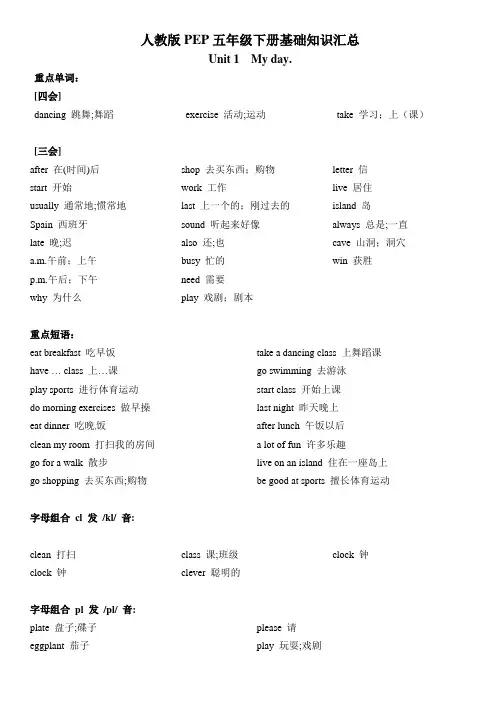
人教版PEP五年级下册基础知识汇总Unit 1 My day.重点单词:[四会]dancing 跳舞;舞蹈exercise 活动;运动take 学习;上(课)[三会]after 在(时间)后start 开始usually 通常地;惯常地Spain 西班牙late 晚;迟a.m.午前;上午p.m.午后;下午why 为什么shop 去买东西;购物work 工作last 上一个的;刚过去的sound 听起来好像also 还;也busy 忙的need 需要play 戏剧;剧本letter 信live 居住island 岛always 总是;一直cave 山洞;洞穴win 获胜重点短语:eat breakfast 吃早饭have … class 上…课play sports 进行体育运动do morning exercises 做早操eat dinner 吃晚饭clean my room 打扫我的房间go for a walk 散步go shopping 去买东西;购物take a dancing class 上舞蹈课go swimming 去游泳start class 开始上课last night 昨天晚上after lunch 午饭以后a lot of fun 许多乐趣live on an island 住在一座岛上be good at sports 擅长体育运动字母组合cl 发/kl/ 音:clean 打扫clock 钟class 课;班级clever 聪明的clock 钟字母组合pl 发/pl/ 音:plate 盘子;碟子eggplant 茄子please 请play 玩耍;戏剧重点句型:1.询问别人什么时候做某事的问句及回答:-- When do/does + 主语+ 动词(短语)原形(+ 其他)?-- 主语(+ 频度副词)+ 动词(短语)原形/ 第三人稀单数形式+ at + 具体时间/ At + 具体时间.-- When do you get up? 你什么时候起床?-- I get up at 5 o'clock. 我5点起床。
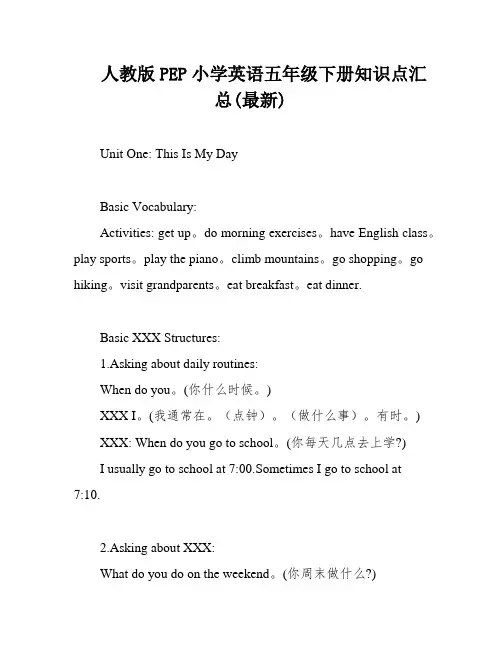
人教版PEP小学英语五年级下册知识点汇总(最新)Unit One: This Is My DayBasic Vocabulary:Activities: get up。
do morning exercises。
have English class。
play sports。
play the piano。
climb mountains。
go shopping。
go hiking。
visit grandparents。
eat breakfast。
eat dinner.Basic XXX Structures:1.Asking about daily routines:When do you。
(你什么时候。
)XXX I。
(我通常在。
(点钟)。
(做什么事)。
有时。
)XXX: When do you go to school。
(你每天几点去上学?)I usually go to school at 7:00.Sometimes I go to school at7:10.2.Asking about XXX:What do you do on the weekend。
(你周末做什么?)XXX I。
(我通常/经常。
有时。
)XXX: What do you do on the weekend?I often play XXX I go shopping with my mom.3.Introducing one's own habits:Every weekend。
I go hiking。
(我每个周末远足。
)Every day。
I do my homework at 8:00 in the evening。
(我每天晚上8点做作业。
)4.Asking XXX:What do you do。
(你是干什么的?)Time:morning。
afternoon。
evening。
noon。
at night。
6:00.on Sunday。
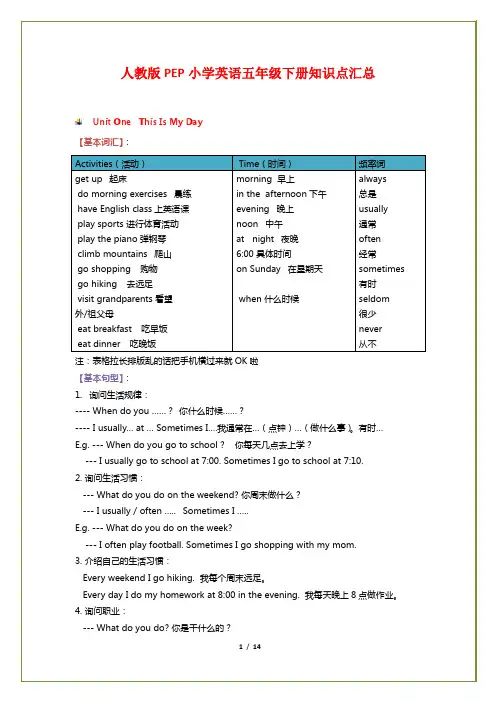
人教版PEP小学英语五年级下册知识点汇总Unit One This Is My Day【基本词汇】:Activities(活动) Time(时间)频率词get up 起床do morning exercises 晨练 have English class上英语课 play sports 进行体育活动 play the piano 弹钢琴climb mountains 爬山go shopping 购物go hiking 去远足visit grandparents 看望外/祖父母eat breakfast 吃早饭eat dinner 吃晚饭morning 早上in the afternoon下午evening 晚上noon 中午at night 夜晚6:00 具体时间on Sunday 在星期天when 什么时候always总是usually通常often经常sometimes有时seldom很少never从不注:表格拉长排版乱的话把手机横过来就OK啦【基本句型】:1. 询问生活规律:---- When do you ……?你什么时候……?---- I usually… at …Sometimes I….我通常在…(点钟)…(做什么事)。
有时…E.g. --- When do you go to school ? 你每天几点去上学?--- I usually go to school at 7:00. Sometimes I go to school at 7:10.2. 询问生活习惯:--- What do you do on the weekend? 你周末做什么?--- I usually / often ….. Sometimes I …..E.g. --- What do you do on the week?--- I often play football. Sometimes I go shopping with my mom.3. 介绍自己的生活习惯:Every weekend I go hiking. 我每个周末远足。
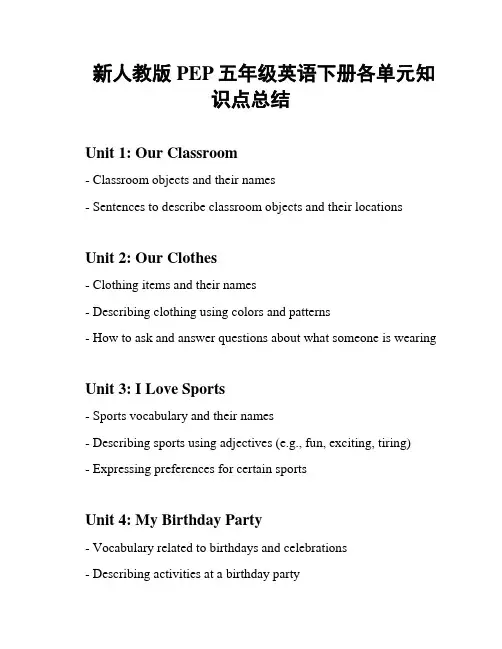
新人教版PEP五年级英语下册各单元知识点总结Unit 1: Our Classroom- Classroom objects and their names- Sentences to describe classroom objects and their locationsUnit 2: Our Clothes- Clothing items and their names- Describing clothing using colors and patterns- How to ask and answer questions about what someone is wearingUnit 3: I Love Sports- Sports vocabulary and their names- Describing sports using adjectives (e.g., fun, exciting, tiring)- Expressing preferences for certain sportsUnit 4: My Birthday Party- Vocabulary related to birthdays and celebrations- Describing activities at a birthday party- Expressing likes and dislikes about different party elementsUnit 5: At the Farm- Vocabulary related to farm animals and their names- Describing farm animals using adjectives (e.g., big, small, noisy) - Describing activities at a farm (e.g., feeding animals, milking cows)Unit 6: A Fun Day Out- Vocabulary related to amusement park rides and activities- Describing activities and experiences at an amusement park- Expressing likes and dislikes about different rides and activitiesUnit 7: A Friendly Letter- Vocabulary related to writing a letter (e.g., greeting, closing, signature)- Structure of a friendly letter- Writing a letter to a friend, describing personal experiences or activitiesUnit 8: Our Pets- Vocabulary related to pets and their names- Describing pets using adjectives (e.g., cute, friendly, playful)- Talking about responsibilities and caring for petsUnit 9: Our Earth- Vocabulary related to the environment and nature- Describing different natural elements (e.g., mountains, rivers, plants)- Expressing concerns and suggesting actions to protect the environmentUnit 10: Fun with Art- Vocabulary related to art and artistic activities- Describing different art forms (e.g., drawing, painting, sculpting) - Talking about personal preferences for different art activitiesUnit 11: Let's Travel- Vocabulary related to travel and transportation- Describing different modes of transportation (e.g., car, train, airplane)- Talking about travel experiences and preferences for different destinationsUnit 12: Healthy Habits- Vocabulary related to health and healthy habits- Describing different healthy habits (e.g., exercise, balanced diet, enough sleep)- Talking about personal choices and habits for a healthy lifestyle。
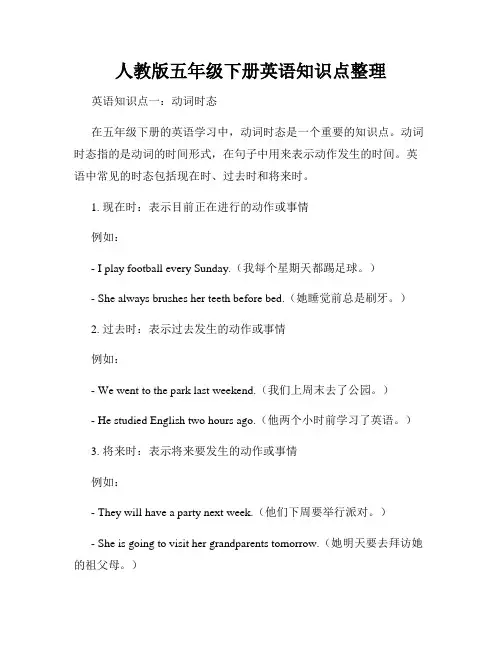
人教版五年级下册英语知识点整理英语知识点一:动词时态在五年级下册的英语学习中,动词时态是一个重要的知识点。
动词时态指的是动词的时间形式,在句子中用来表示动作发生的时间。
英语中常见的时态包括现在时、过去时和将来时。
1. 现在时:表示目前正在进行的动作或事情例如:- I play football every Sunday.(我每个星期天都踢足球。
)- She always brushes her teeth before bed.(她睡觉前总是刷牙。
)2. 过去时:表示过去发生的动作或事情例如:- We went to the park last weekend.(我们上周末去了公园。
)- He studied English two hours ago.(他两个小时前学习了英语。
)3. 将来时:表示将来要发生的动作或事情例如:- They will have a party next week.(他们下周要举行派对。
)- She is going to visit her grandparents tomorrow.(她明天要去拜访她的祖父母。
)英语知识点二:名词复数形式名词复数形式是五年级下册英语学习中的另一个重要知识点。
在英语中,名词的复数形式对于表达数量和事物的关系非常重要。
1. 一般情况下,名词的复数形式可以通过在词尾加上-s来表示例如:- book - books(书 - 书籍)- cat - cats(猫 - 猫咪)2. 以s, x, ch, sh结尾的名词,复数形式通常在词尾加-es例如:- bus - buses(公共汽车 - 公共汽车)- box - boxes(盒子 - 盒子)3. 以辅音字母+y结尾的名词,将y改成i, 再加-es例如:- baby - babies(婴儿 - 婴儿们)- city - cities(城市 - 城市)英语知识点三:形容词比较级和最高级形容词比较级和最高级是五年级下册英语学习中的重点内容。
千里之行,始于足下。
人教版五年级英语下册全册知识点总结人教版五年级英语下册总结1. 词汇:- 人称代词:I, you, he, she, it, we, they- 动词:be动词 (am, is, are), 常见动词 (like, have, go, do, see, eat, play)- 数字:1-1000- 家庭成员:father, mother, brother, sister, grandfather, grandmother- 学科名称:English, Chinese, math, science, P.E., music, art - 学习用品:book, pencil, eraser, ruler, sharpener, bag- 季节:spring, summer, autumn, winter- 食物:rice, noodles, bread, eggs, milk, fruits, vegetables - 动物:dog, cat, bird, fish, rabbit, panda, monkey- 蔬菜:carrot, tomato, potato, cabbage, cucumber, onion- 水果:apple, banana, orange, pear, grape, strawberry2. 句型:- What's your name?/My name is...- How old are you?/I'm ... years old.- Where are you from?/I'm from ...- What do you like?/I like ...- Can you ...?/Yes, I can./No, I can't.- What's the date today?/Today is ...- What's the weather like?/It's ...- Do you have ...?/Yes, I do./No, I don't.第1页/共2页锲而不舍,金石可镂。
人教版五年级下英语知识点人教版五年级下册英语教材涵盖了多个知识点,包括词汇、语法、句型结构、阅读和写作技巧等。
以下是一些主要的知识点概述:# 词汇学习1. 日常生活词汇:学习与日常生活相关的词汇,如家庭成员、日常活动、食物、衣物等。
2. 学校生活词汇:学习与学校生活相关的词汇,如学科名称、学习用品、学校设施等。
3. 节日和文化词汇:了解不同节日和文化相关的词汇,如春节、圣诞节、感恩节等。
# 语法要点1. 一般现在时:掌握描述日常习惯和事实的一般现在时态。
2. 现在进行时:学习描述正在进行的动作的现在进行时态。
3. 一般过去时:了解描述过去发生的事情的一般过去时态。
4. 比较级和最高级:学习形容词和副词的比较级和最高级形式。
# 句型结构1. 简单句:能够构造和理解由主语、谓语和宾语构成的简单句。
2. 并列句:学习使用并列连词(如and, but, or)连接两个或多个简单句。
3. 复合句:掌握使用从属连词(如because, although, when)连接主句和从句的复合句。
# 阅读技巧1. 理解主旨大意:学会快速浏览文章,抓住文章的主旨大意。
2. 细节理解:通过阅读,能够找到文章中的具体信息和细节。
3. 推理判断:根据文章内容进行逻辑推理,得出结论。
# 写作技巧1. 描述性写作:学习如何描述人、地点、事物等。
2. 叙事性写作:掌握叙述一个事件或经历的写作技巧。
3. 书信写作:学习书信的基本格式和表达方式。
# 听力技巧1. 捕捉关键信息:在听力练习中,学会捕捉对话或短文中的关键信息。
2. 理解语境:通过上下文理解听力材料中的隐含意义。
# 口语表达1. 日常对话:练习日常交流中的基本对话。
2. 角色扮演:通过角色扮演活动,提高语言的实际运用能力。
# 结尾五年级下册英语的学习是一个循序渐进的过程,需要学生在老师和家长的引导下,不断练习和巩固所学知识。
通过多样化的教学活动和实践,学生可以更好地掌握英语语言技能,为未来的学习打下坚实的基础。
五年级英语下册人教版重点重点 1:动词的时态在五年级英语下册的学习中,动词的时态是一个重点内容。
在学习英语时,掌握动词的时态是非常重要的,因为时态可以帮助我们准确地表达过去、现在和将来的动作或状态。
英语中有三个基本的时态:过去时、现在时和将来时。
过去时用来描述已经发生的动作或状态,现在时用来描述正在发生的动作或状态,将来时用来描述将要发生的动作或状态。
动词的时态变化规则是根据动词的不同形式来确定的。
例如,一般过去时的动词形式是在动词原形的基础上加上-ed或-d。
例如,动词“play”的一般过去时形式是“played”,动词“work”的一般过去时形式是“worked”。
在学习动词时态时,我们还需要注意一些特殊的动词形式。
例如,动词“be”的过去时是“was”和“were”,现在时是“am”、“is”和“are”,将来时是“will be”。
动词“do”的过去时是“did”,现在时是“do”和“does”,将来时是“will do”。
掌握动词的时态对于正确的语法和交流是至关重要的。
当我们写作或说英语时,正确地使用动词的时态可以使我们的意思更加清晰和准确。
重点 2:名词的单复数形式另一个重点内容是名词的单复数形式。
在英语中,名词的单复数形式是根据名词的词尾来确定的。
有些名词在词尾加上-s或-es来变成复数形式。
例如,名词“book”的复数形式是“books”,名词“bus”的复数形式是“buses”。
然而,有些名词的复数形式并不是简单地在词尾加上-s或-es。
有一些名词的复数形式需要根据其词尾的不同来进行变化。
例如,名词“child”的复数形式是“children”,名词“man”的复数形式是“men”。
在学习名词的单复数形式时,我们还需要注意一些特殊的名词形式。
例如,名词“foot”的复数形式是“feet”,名词“tooth”的复数形式是“teeth”。
这些名词的复数形式需要记忆和熟练运用。
正确地使用名词的单复数形式可以使我们的语言更加准确和流利。
人教版五年级下册英语重点内容作为小学五年级学生,英语学习是非常重要的一部分。
本文将总结和介绍人教版五年级下册英语的重点内容,为同学们的学习提供方便和帮助。
一、基础词汇通常情况下,学习任何一门外语都需要一定的基础词汇量。
人教版五年级下册英语也不例外。
以下是一些基础词汇,同学们应该理解和熟练掌握。
•数字 1-100•月份和季节•时间和日常生活中的时钟时间•颜色和形状•对话中常用的简单问和答除了这些基础词汇,同学们还应该掌握如何读音节、单词拼写和基本的语法知识,例如三单形式、常见的连词和代词等。
二、语法知识在学习英语时,掌握语法非常重要。
以下是人教版五年级下册英语重点语法知识。
1. 现在进行时现在进行时(Present Continuous)表示现在正在发生的动作或状态。
这种时态通常由“be”动词和现在分词组成。
例如:“I am reading a book.” (我正在读一本书。
)2. 一般将来时一般将来时(Simple Future)表示将要发生的动作或状态,例如:“I will go to see a movie tomorrow.” (我明天要去看电影。
)在这种时态下,“will”是辅助动词。
3. 形容词比较级和最高级在某些情况下,需要使用比较形式和最高级形式。
比较形式(Comparative)与另一个事物相比较,如“taller”和“smarter”等。
最高级(Superlative)形式表示与所有其他事物相比较,如“tallest”和“smartest”等。
三、听力和口语除了掌握基础词汇和语法知识,听力和口语也是英语学习中的关键因素。
人教版五年级下册英语强调听和说的综合能力。
以下是一些需要注意的内容。
1. 听力在学习英语的过程中,需要大量的听力练习。
听懂英语对于提高口语和阅读水平非常有帮助。
同学们可以选择听英语歌曲、看英语电影或参加英语听力班级练习。
2. 口语在日常生活中,口语是十分重要的。
人教版五年级英语下册全册知识点总结回答方式多样,以下是一些例子:I usually play sports or go shopping on the weekend.(我通常在周末进行体育运动或去购物。
)I XXX(我周六上舞蹈课,周日在家休息。
)It depends。
Sometimes I hang out with friends。
sometimes I do some housework。
and sometimes I just watch TV.(这要看情况。
有时我和朋友出去玩,有时我做些家务,有时我就看电视。
)注意:询问别人周末做什么时,可以使用what或how来引导问句。
回答时,可以使用usually。
sometimes等频度副词来表达经常性或偶尔性的活动。
Unit 1一、重点词汇吃早餐:eat breakfast 上······课:have。
class进行体育运动:play sports做早操:do morning exercises 打扫我的房间:clean my room 去购物:go shopping舞蹈:dancing上午:a.m.通常地:usually二、其他日常活动起床:get up上床睡觉:go to bed活动,运动:exercise吃晚饭:eat XXX散步:go for a walk研究,上(课):XXX上舞蹈课:take a dancing class下午:p.m.吃午饭:eat XXX洗脸:XXX洗我的衣服:XXX看电视:watch TV打乒乓球:play ping-pong弹琵琶:play the pipa去游泳:go swimming去跑步:go running做作业:do homework练武术:do XXX踢足球:play football打篮球:play basketball三、语音cl→ [cl]:clean。
Unit One My day重点单词:eat breakfast吃早餐have… class上…课play sports进行体育运动exercise活动,运动do morning exercises做早操eat dinner吃晚饭clean my room打扫我的房间go for啊walk 散步go shopping去买东西,购物take 学习,上课dancing 舞蹈,跳舞take a dancing class上舞蹈课when 什么时候重点句子:1.When do you finish class in the morning? 你们上午的课几点结束?2.We finish class at 1 o’clock.我们一点钟结束上午的课.3.What do you do on the weekend? 你周末在做什么?4.I often watch TV and play ping-pong with my father. 我经常看电视,也常和我爸爸一起打乒乓球.口语交际:一A: When do you finish class in the morning? 你们上午的课几点结束?B: We finish class at 1 o’clock. Then we eat lunch at home. 一点结束。
然后我们回家吃午饭。
A: Wow! When do you go back to school after lunch? 午饭后几点到校?B: At 2:30. Classes start at 3 o’clock. 两点半到校,三点上课。
A: When do you usually eat dinner in Spain? 在西班牙你们通常几点吃晚饭?B: Usually at 9:30 or 10 o’clock. 通常在九点半或十点。
A: Wow! That’s too late! 哇,也太迟了吧二A: Why are you shopping today? 今天你怎么去购物了?B: My mum worked last night, so I’m shopping today. 我妈妈昨晚上夜班了,所以今天我购物.A: Good girl! So what do you do on the weekend? 好孩子!那你周末做什么?B: I often watch TV and play ping-pong with my father. 我经常看电视,也和我爸爸打乒乓球.A: That sounds like a lot of fun. 听起来很有意思吧.B: Yes, but I’m also hard-working. I usually wash my clothes. Sometimes I cook dinner. 是啊, 不过我也很爱干活,通常洗洗衣服,有时也做做饭.A: You’re so busy! You need a robot to help you! 你也太忙了,你需要个机器人帮忙.语音训练:辅音字母组合的发音:Cl [kl] clean clock class cleverPl [pl] plate eggplant please playUnit Two My favourite重点单词:spring春天summer夏天autumn秋天winter冬天season 季节picnic野餐goon a picnic去野餐pick摘,采集pick apples摘苹果snowman雪人make a snowman堆雪人go swimming去游泳which哪一个重点句子:1.Which season do you like best? 你最喜欢哪个季节?2.I like winter best, I can sleep all day. 最喜欢冬季了. 可以整天睡觉。
3.Why (do you like summer)? 你为什么喜欢夏天呢?4.Because I like summer vacation! 因为我喜欢暑假。
口语交际;A: Do you like the music, children? 孩子们,你们喜欢音乐吗?B: Yes, it’s very beautiful. What is it? 是的,音乐太美了。
是什么音乐呢?A: The Four Seasons. Today we’ll draw the seasons. Which season do you like best, Mike? 四季歌。
今天我们学画季节。
迈克,你最喜欢哪个季节?B: Winter. I like snow. 冬天,我喜欢雪。
A: I like snow, too. Which season do you like best, Wu Yifan? 也喜欢雪。
一帆,你最喜欢哪个?C: Spring. 春季。
A: Why do you like it? 为什么呢?C; It’s pretty. 它很美。
A: Yes , it is. 可不是嘛。
语音训练;字母组合br和gr的发音:[br]和[gr][br] brown library brother umbrella[gr] green grape grandpa growUnit Three My school calendar重点单词;January 一月February二月March三月April四月May五月June六月July七月August八月September九月October 十月November十一月December十二月重点句子:1.When is the party? 聚会什么时候举行?2.It’s in April. 在4月.3.When is the trip this year? 今年的秋游在什么时候?4.It’s in October. We’ll go to the Great Wall. 在十月. 我们要去长城.口语交际:A: We have a few fun things in spring. 春季我们有几件令人开心的事情.B: What are they? 什么事呢?A: After the sports meet. We have an Easter party. 运动会后, 我们要举行复活节聚会呢B: When is the party? 聚会在什么时候?A: It’s in April. We have a school trip, too. 在4月, 我们还要进行一次郊游呢.B: When is that? 在什么时候?A: It’s in May 在5月份.B: Cool! 太好了!二A: I like autumn. I really like the colours. 我喜欢秋天, 我真的很喜欢秋天缤纷的色彩.B: I like autumn, too. We usually have a school trip in autumn, 我也喜欢秋天。
秋天我们通常要进行秋游。
A: Great! When is the trip this year? 太好了。
今年的秋游在什么时候?B; It’s in October. We’ll go to the Great Wall. 在10月。
我们会去长城。
A: Cool! I love the Great Wall. 太棒了!我就喜欢长城。
语音训练:字母组合sh和ch的发音:[ʃ]和[ʧ][tʃ] China chicken lunch teacher[ʃ] sheep fish shirt shortsUnit four When is Easter?重点单词;first第一second第二third第三fourth第四fifth第五twelfth(12th) 第十二twentieth(20th) 第二十twenty-first(21st) 第二十一twenty-third(23rd)第二十三thirtieth(30th)第三十重点句子:1.When is April F ool’s Day? 愚人节是哪天?2.It’s on April 1st. 是在四月一日3.When is your birthday? 你的生日是哪天?4.My birthday is on April 4th. 我的生日是四月四号.5.What do you usually do on Mid-Autumn Day? 中秋节你通常做什么?6.We eat mooncakes.我们吃月饼.口语交际:A: There are some special days in April四月有几个特别的日子。
B: What are they? 是什么呢?A: April Fool’s Day and Easter. 愚人节和复活节呀。
B: When is April Fool’s Day? 愚人节在什么时候?A: It’s on April 1st.四月一日。
B: And Easter? 复活节呢?A: It’s on April 5th this year. 在今年四月五日。
B: Wow! I love April. 哇,我喜欢四月。
A: When is your birthday? 你生日是什么时候?B: My birthday is on April 4th. 是在四月四日。
A: That’s my mother’s birthday, too. 那也是我妈妈的生日。
B: Cool ! What will you do for your Mum? 太妙了,你会为你妈妈做些什么吗?A: I’ll cook noodles for her. 我会为她煮面条。
B: Chinese noodles are delicious! 中国面条太好吃了。
A: Please come then, we can have a birthday party for both of you! 那就来我家吧,我们一起为你俩过生日。
语音训练字母组合th的发音:[θ]和[ð][θ] three thin thirteen maths[ð] this that mother brotherUnit Five Whose dog is it?重点单词:mine我的yours你的,你们的his他的hers她的theirs他们的,她们的,它们的ours我们的climbing(正在)攀登, 攀爬eating正在吃(东西) playing正在玩耍jumping正在跳drinking正在喝水sleeping正在睡觉重点句子:1.The yellow picture is mine.那张黄色的画是我的.2.Are these all ours? 这些都是我们的画吗?3.Whose is it? 这是谁的?4.It’s Zhang Peng’s. 是张鹏的。